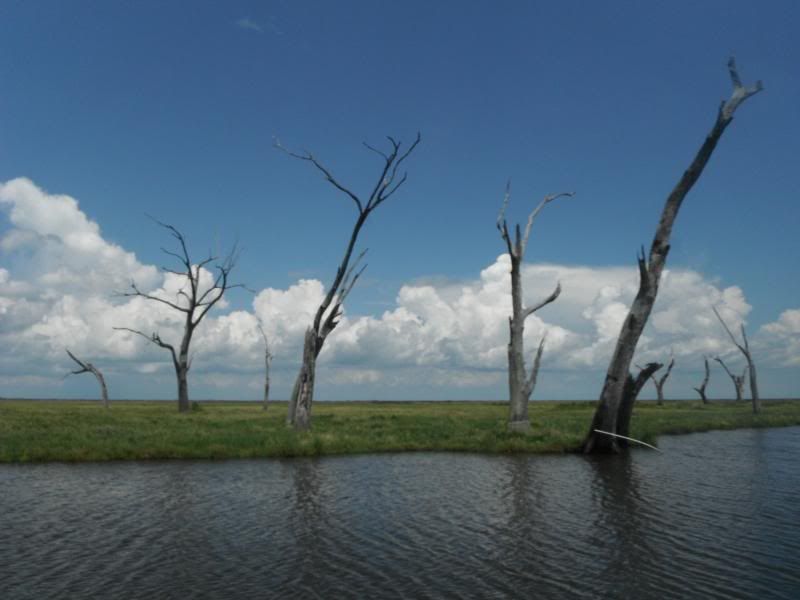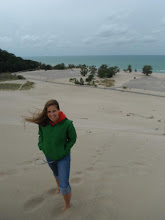Ok, this is the part where I'm going to start discussing the film with reckless abandon, so if you are highly offended by spoilers and haven't seen it, go away (for now, I hope you'll come back another time to talk about this and other things). If you haven't seen it, I'd be more than happy to lend you my copy. Just send me your address.
Here, I'll stick a map in here so you don't have to see more words if you don't want to:
View Larger Map
So that long, skinny northeast-southwest line is the road to Isle de Jean Charles (the northish-southish oriented thing at the southwestern end of the road), one of the communities I'm working with through the First People's Conservation Council. It has recently been rebuilt, but it's still just a narrow two lane road with no kind of buffer on either side of it to protect it from high or rough water. (In fact, there was a temporary road put on the southern side of it, that is being removed-- why? Why spend the extra time and money to remove something that might potentially help? Sigh, bureaucracy.) And there is definitely plenty of water there, since various levees and flood walls have completely destroyed the wetlands as well as the island itself. Pointe-aux-Chenes, which I've mentioned once or twice, is what the road connects Isle de Jean Charles to. (And Montegut, just north of Pointe-aux-Chenes, is where the movie was filmed.)
Isle de Jean Charles is the place that bayou village Charles Doucet, which its citizens call The Bathtub, is based on. And while I think the movie did an adequate job of capturing the some of the joy and camaraderie that exists in little bayou camps, I could immediately see why the people of these real-life communities take exception to the movie's portrayal of them. The people of The Bathtub live in absolute squalor.
There were a lot of things I liked about the movie. For one, it's just beautifully filmed-- yes, literally filmed in a world where most major movies are made digitally. I like that the actors and actresses were mostly, if not all, from south Louisiana (and for many, this was their first time acting).
There's sort of this whimsical, mystical take on climate change, the melting ice caps, and the destruction of the bayou, and the main character, Hushpuppy, says a lot of things about the interconnectedness of the universe. "The whole universe depends on everything fitting together just right."
I liked the honesty of the very sad, difficult, complicated story line of the storm's aftermath: this community trying to fend for itself by building a floating camp and blowing up the levee that was keeping their village under water; the fact that the mandatory evacuation enforced several weeks after the hurricane, with emphasis on the "force" part of "enforced"; the one way bus tickets issued to miscellaneous towns around the US. The storm in question wasn't called Katrina, but certainly carried a lot of her baggage.
I liked the inclusion of salt water intrusion, a subtle nod to the very real environmental problems of this region. "Two weeks later, everything started to die." Here's my picture from September of trees killed off by salt water in that neck of the bayou:

There was a lot about this movie that gave me mixed feelings. Like I said, the film portrays bayou camp dwellers as living in filth. I don't think that was especially true to real life, nor do I think it was relevant to the story. I'm sure there are some people who live in run down places amidst random junk, far beyond the grid, but that's not the norm. I've been in some homes that have an eclectic collection of things, but none of them have been so dirty.
I was also frustrated by the idea of the freedom of poverty. I don't think it was especially realistic. Yes, there is certainly some freedom for a culture that is not bound by bank accounts, but I suspect there are way more challenges than benefits (oh hey, super timely article "It Is Expensive to Be Poor"!). I'm not quite sure how Wink gets to the hospital, and back. And what about food? There are plenty of scenes that involve eating, whole chickens put on grills, plentiful seafood, hot peppers growing on the floating camp... in one scene, Hushpuppy is shown munching on some leaf. What about when the wetlands are killed by pollution or salt water? How did they get fresh water? What about oil? The BP Horizon disaster happened when this movie was being filmed. All kinds of environmental problems contribute to challenging food security. When you don't have a bank account, you can't just go buy what you can't catch.
The end scene with the community walking down the road to The Bathtub, which is the actual road to Isle de Jean Charles, and the waves splashing up across it... eerie. And so real. It doesn't even take a storm, just a stiff wind or a full moon. These are communities just about ready to fall off the earth, and with practically no attention or sympathy. I mean, in the movie, the authorities didn't notice the people still in The Bathtub until after they blew up a levee to let the water out. It took a literal explosion for anyone to check on them. That was probably relatively close to reality, because as it is, there is little to no local, state or federal government assistance for these precious places, or the people in them.
I guess that's where other people step in, take exception to an otherwise beautiful movie, and try their best to raise some awareness and get some help to these communities. There's a lot of good going on down here, but it seems there are infinite challenges for each positive step taken. I know I am barely scratching the surface. But, Hushpuppy said it, late in the film, "I see that I'm a little piece of a big, big universe. And that makes things right."

No comments:
Post a Comment